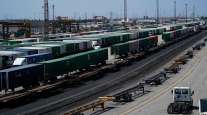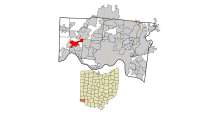BNSF, CP Pledge to Provide Trains to Ship Fertilizer to US Farmers
This story appears in the April 28 print edition of Transport Topics.
The two main railroads serving the oil-producing states in the Upper Midwest have pledged to dedicate enough equipment to get adequate fertilizer shipments to farmers there in time for spring planting.
BNSF Railway said in its April 16 response to a Surface Transportation Board order that it is working to get “high volumes” of fertilizer into the marketplace as quickly as it can.
“Under our plan, we expect to move 52 trainloads [shipments ranging from 65 to 85 cars] of fertilizer over a six-week period in BNSF-direct unit train service, which is the most efficient way to get the maximum volume of fertilizer to critical agricultural destinations served by BNSF,” the carrier said.
Twenty-one trainloads will go to South Dakota, 10 to North Dakota, six to Minnesota, and two to Montana with the balance destined to other states, BNSF said.
The railroad also said it will allow locomotives to remain with the fertilizer trains during loading and unloading, will add 110 jumbo hopper cars to its existing fertilizer fleet and will have crews positioned ahead of time to speed the process.
Separately, Canadian Pacific said it “understands the urgency of moving last year’s grain harvest out and moving fertilizer and nutrients in for the next planting season” and anticipates that after extreme winter weather ends in Chicago, lower transit times will result for all shipments.
CP also said, however, that it “has a relatively small presence” in fertilizer and that the “vast majority” of its fertilizer shipments move in cars supplied by customers, so it could not specify how many shipments it would transport.
CP told the STB that the carrier’s share of the market in agricultural fertilizer shipments is only about 10% in the Dakotas, Iowa and Minnesota.
In addition to submitting plans for accelerating fertilizer shipments, the rail carriers also were ordered to submit, starting April 25, weekly status reports on shipment numbers.
In its response to the STB order, CP said its volume of fertilizer shipments is so small that it wants to be excused from that requirement.
STB declined comment to Transport Topics for this story.
However, Roger Johnson, president of the National Farmer’s Union, said he believed the railroads responded appropriately and that “we’re going to get it delivered on time.”
Johnson is a former North Dakota commissioner of agriculture.
“As bad as it is to be very late in delivering railcars to ship out grain, it’s a far worse economic impact to not get fertilizer delivered on time when you’re in the middle of spring planting,” he said.
At an STB hearing April 10, farmers and silo operators aired complaints that their 2013 corn, wheat and soybean crops are spoiling in storage because the railroads would rather make more lucrative runs for oil producers than serve farmers.
BNSF’s oil shipments increased 43% last year in response to the nation’s oil production boom.
As a result, Johnson said, farmers will continue to press the STB to ensure that there will be enough trains to haul the fall harvest.
However, he said, this year’s planting season could be a very difficult one, which is why the fertilizer issue arose at the hearing and the STB acted.
Spring is late, and the demand for fertilizer is not going to be visible right away, he said, because bins and tanks are full.
“As they empty out, they need to be replenished on a very timely basis because . . . you’ve got a narrow window for planting,” Johnson said. “If the fertilizer is not there and farmers are ready to seed, they’ve got a really tough decision to make.”
The choice is go ahead and seed without fertilizing and hope the fertilizer arrives, and then you can make another pass, but that drives up the overhead on a crop, he said.




